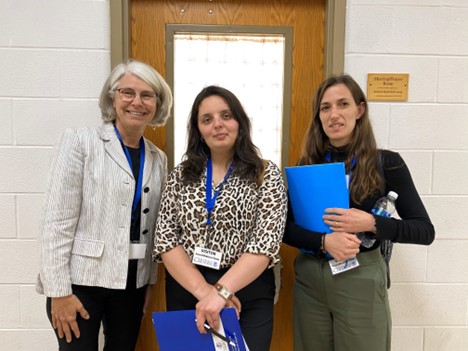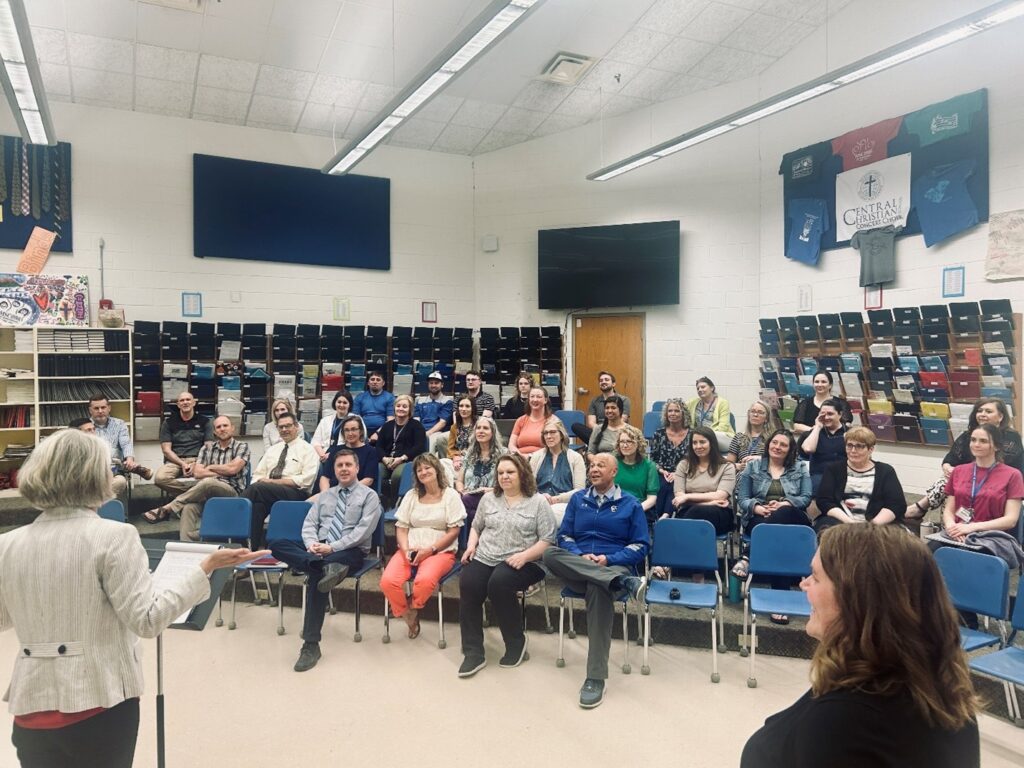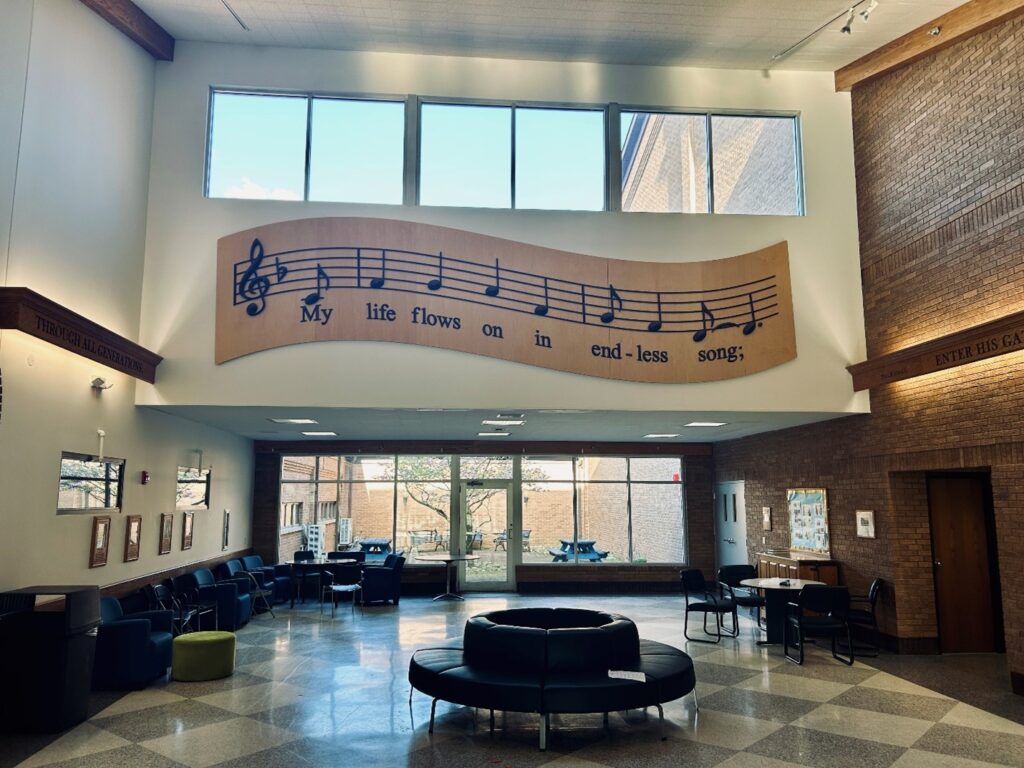A new accreditation model, developed by and for Mennonite Schools Council schools, is creating space for schools to help one another succeed.
By Zach Bower, high school social studies and communications associate for Dock Mennonite Academy
The partnership between the Mennonite Schools Council (MSC) and Cognia accrediting agency has changed, creating new opportunities to live out the mantra “Better Together.”
Administrators at Dock Mennonite Academy and Lancaster Mennonite School noticed an exciting opportunity, as they were beginning preparations for their most recent accreditation, planned for the 2022-23 school year. In spring 2022, Dr. Conrad Swartzentruber, Dock’s superintendent and MSC chair, Dr. Sharon Fransen, Dock’s assistant superintendent of curriculum and instruction, and Jenn Esbensade, who, at the time was the director of curriculum at Lancaster Mennonite School, began creating a vision and laying the groundwork for a new accreditation process tailored just for MSC schools. The end product was a unique school accreditation process that continues to utilize the highest “industry standards” of Cognia, a secular accrediting agency, combined with Anabaptist faith standards and External Review Teams that consist of all MSC educators. Prior to this new model, Mennonite Education Agency had been partnered with Cognia and historically held responsibility for the accreditation process of MSC schools. Recommendations for accreditation are now approved by the Mennonite Schools Council Executive Committee and continue to be sent to Cognia, allowing for dual accreditation.
Accreditation is a forward-focused process, by which schools reflect and examine their current policies, practices and culture through data analysis, document their continuous improvement journey, and assess and map out their future steps — all verified by an outside organization.
The journey towards this new accreditation process started with Fransen and Esbenshade working together to define and clarify MSC and Cognia’s relationship, so that MSC could have a specific mechanism, within Cognia’s parameters, for accrediting schools that aligned with MSC vision and values. In fact, five additional standards that are specific to the needs of MSC schools and focus on features of Anabaptist identity were created and added to Cognia standards. Esbenshade said she is proud of the work completed and hopes that “MSC partners see the value in accreditation and that it is an opportunity for schools to reflect on and thoroughly analyze all aspects of their work … while providing an outside perspective that can give yet another voice into strengths and areas of improvement.” During the 2022-23 school year, Esbenshade led Lancaster Mennonite School through its accreditation process, using the new model, in addition to leading the review teams for Dock and Quakertown Christian School.
The new accreditation process builds on the model that MEA established for accreditation in years prior, which also utilized Cognia standards for accreditation, through an Anabaptist lens, and allowed for one MSC educator on the External Review Teams. Having only MSC educators on review teams in the new model caused pause at first for some, who were unsure if visiting one another’s schools would be as helpful as having “outsiders” visit. But, in fact, the opposite has happened. The Mennonite educators who have been on the review teams care deeply about one another’s schools, understand a shared context and purpose, and have kept the integrity of the process high. Dr. Brad Anderson, the head of school at Freeman Academy, led his school through accreditation last year and shared afterward, “While we have had pleasant experiences with non-Mennonite teams in the past, it is helpful to have staff from fellow Mennonite schools who understand both the benefits and challenges of Anabaptist-shaped education.”
As of summer 2024, Dr. Fransen has assisted seven MSC schools in the accreditation process, using the new model, in addition to providing leadership to External Review Teams for five of those schools. The process includes a rigorous self-assessment, in which the schools evaluate themselves against Cognia and the new MSC Anabaptist identity standards, as well as reviewing and analyzing student performance data, stakeholder feedback data and classroom environment data. At the end of the self-study, an External Review Team reviews the evidence provided by the school and conducts an on-site team visit, to collect first-hand evidence. The team provides valuable feedback and guidance for the school, to help it focus its improvement efforts into the future. Fransen said she is, “thrilled that we have schools and team members that are building relationships and see the value in what we are doing; we are seeing we are better together.”
Lindsay Carson, the elementary principal at Lancaster Mennonite School, has been part of two External Review Teams — co-leading one— and also assisted LMS with their own accreditation last year, using the new model. Carson shared, “It has been incredible for me to be able to see deeply into the life and systems of schools so similar to my own but in a slightly different context.” Dr. Fransen says it is hard to put a value on the relationships that are built while on the review teams:
“When you have three to four different MSC schools represented on the same team, you have people from all over the country with the same values working on, and sometimes struggling with, the same kinds of things. You learn about programming but also build relationships.”
Esbenshade agreed, saying that she felt that, “there is so much to learn from each other and so many ways to partner together to strengthen education.”
In addition to her responsibilities at Dock, Dr. Fransen now holds the role of MSC accreditation coordinator, in which she works to develop protocols and is responsible for guiding MSC schools through the accreditation process. Next steps and hopes for her in this role include training more MSC educators for review teams, assisting a school in receiving first-time accreditation and continuing to be inspired by and supporting Mennonite education.

There is an effort to include educators on the review teams that are a part of schools that will experience accreditation the next year. Following this pattern, the External Review Team that Fransen and Carson co-led at Central Christian School last spring included two teachers from Lezha Academic Center in Albania. Alma Kola and Denisa Fida made the long journey to Ohio to join the review team for Central, while also taking notes and gaining experience for their role of leading Lezha through the Cognia/MSC accreditation process next year, which would make Lezha Academic Center the first school in Albania to be accredited. Dr. Fransen and Dr. Swartzentruber started to lay the groundwork for Lezha’s accreditation when they visited Albania last winter.

Dr. Fransen said, “It is one thing to know that Mennonite schools are out there, but to have them as a caring community that supports is a gift.” She said, “Dock has benefitted from my involvement in this work by the ways I am encouraged and the ideas I bring back … sometimes I get a question from a teacher or an administrator, and now I can point [them] toward an educator or idea at another Mennonite school.”

Carson shared, “I am so inspired to be reminded that Mennonite education is its own philosophy of education that transcends geography. … I have consistently seen dedicated faculty who are multi-talented, relational with students, resourceful, making connections to stewardship and peacebuilding, and building strong and diverse communities. The innovation in Mennonite schools is something we take for granted but is absolutely worth sharing.”
As of summer 2024, nine MSC schools have been accredited through Cognia and MSC, and in the last two years, seven have participated in the new Cognia/MSC accreditation model. Dr. Fransen said she feels that leading a tighter, better-aligned accreditation process, that also benefits schools by building bridges and relationships, has reenergized and re-emphasized her support for and involvement in Mennonite education.

